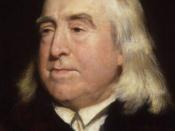1) Introduction: Mill's primary work on rights is On Liberty, which was published in England in 1859. John Stuart Mill was the student of his father James Mill and Jeremy Bentham, who raised him to defend the theory of Utilitarianism. John Stuart Mill was a child prodigy and a genius of historical magnitude. He began reading Greek at the age of three, and Latin at the age of eight - he went on to published important work in a wide range of philosophy, economics, and some of the earliest feminist theory.
2) Overview:
a) Not a social contract theory: Mill's theory is not a social contract theory, and he has no hypothesis about the state of nature or natural rights. Rather, Mill states that his theory of rights is justified by his moral theory, utilitarianism. However, it is not necessary to understand utilitarianism in order to understand his theory of rights.
Because of this, I will delay most discussion of the connection between the two theories until the end of this section.
b) Basics of the theory: Mill's argues that a just state will provide a strong assurance of negative rights to all of its citizens, and will interfere as little as possible in the daily lives of its citizens. The argument begins with a recognition that there is a danger in a democratic government (one that was mentioned as an objection to Locke). The danger is that, since decisions are made by the principle of majority rule, the majority (or simply the most vocal group) will choose to oppress some minority group. For example, when segregation existed in the middle of this century in the US, the black people were being oppressed by the majority of voters which were white; and there were even parts of...


